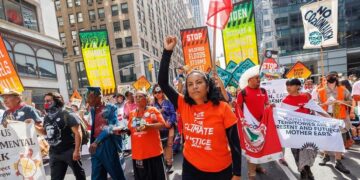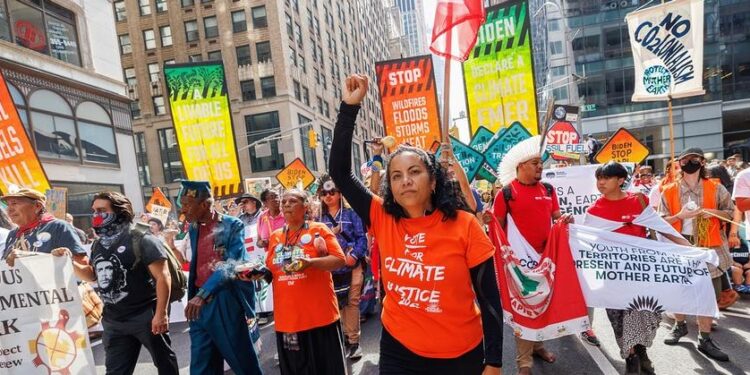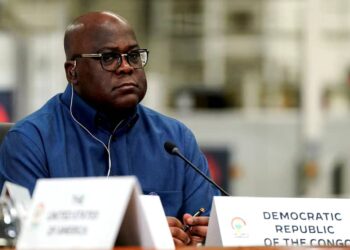By John Ikani
Thousands of climate activists took to the streets of Midtown, Manhattan, kicking off the Climate Week ahead of the UN General Assembly in New York City.
Their signs proclaimed “End Fossil Fuel Use,” “Declare a Climate Emergency,” and “I didn’t vote for fires and floods,” as they urged leaders, including President Joe Biden, to phase out fossil fuels, acknowledging their role in worsening climate change.
President Biden, among other global leaders, is set to attend the United Nations General Assembly, which officially commences on Tuesday.
“We wield the power of the people, the power you need to win this election,” declared 17-year-old Emma Buretta from Brooklyn, representing youth protest group Fridays for Future.
“If you want to secure victory in 2024 and prevent my generation’s blood from staining your hands, put an end to fossil fuels.”
The 75,000 demonstrators, representing approximately 700 organizations and activist groups, encompassed individuals from diverse backgrounds.
US Congresswoman Alexandria Ocasio-Cortez addressed the enthusiastic crowd, saying, “We have people from all corners of the world taking to the streets, demanding an end to what is harming us. We must convey the message that some of us will be inhabiting this planet 30, 40, 50 years from now, and we will not accept rejection.”
UN Sustainable Development Goals Off-Target
Many scientists attribute extreme weather events such as hurricanes, heatwaves, floods, wildfires, and droughts worldwide to greenhouse gases stemming from fossil fuel combustion.
Reducing CO2 emissions plays a central role in addressing climate change. Scientists caution that within the next five years, the world could witness record-high temperatures, with a substantial likelihood of surpassing the critical 1.5-degree Celsius increase.
Prior to the upcoming UN COP28 climate summit, more than 80 nations are working towards an agreement to gradually eliminate coal, oil, and gas.
A recent UN study highlighted the escalating risks of global warming, emphasizing the urgency of comprehensive actions and substantial emissions reductions. This includes a significant reduction in coal-based energy by 2030, as reported by Reuters.
The UN Sustainable Development Goals Summit begins on Monday, aiming to establish a “global rescue plan,” according to UN Secretary-General Antonio Guterres. He noted that only 15% of the sustainable development objectives set in 2015 are likely to be achieved, with some metrics moving in reverse.
To achieve the 2015 target of achieving net-zero carbon emissions by 2050, eliminating the use of fossil fuels without emissions capture or compensation is essential.
Scrutiny on Fossil Fuel Reliance
Leaders from major carbon-emitting nations are notably absent from a special summit led by the UN Secretary-General on Wednesday, reserving the platform for countries committed to tangible actions.
While President Biden has advocated for green manufacturing and allocated significant funds for clean energy, critics argue that he has not taken sufficiently robust steps to reduce the US’s dependence on fossil fuels.
On Friday, California filed a lawsuit against five major oil companies, alleging that they caused billions in damages and downplayed the risks associated with fossil fuels.
Historically, the US has been the largest cumulative emitter of carbon dioxide over the last century, although China now leads in annual emissions.
Protesters Confront Climate Change Impacts
Sunday’s protests marked the start of a weeklong global initiative by Climate Group, a non-profit advocating for climate action. Over 500 protests are planned in 54 countries, including the United States, Germany, England, South Korea, and India.
These rallies serve as a precursor to the upcoming COP28 summit, reflecting growing global concern as climate change-related severe weather events become increasingly frequent.
Dana Fisher, a sociologist at American University specializing in environmental movements, conducted a survey of protest participants. She found that 86% of those surveyed had recently experienced extreme heat, 21% had encountered floods, and 18% faced severe drought. The majority reported feeling sadness and anger.
“Our lives are on the line,” stressed 22-year-old Nalleli Cobo to AFP news agency.



































